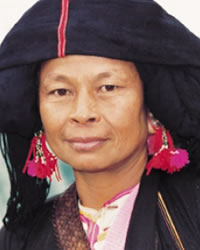Angku in China

Photo Source:
Copyrighted © 2026
Operation China, Asia Harvest All rights reserved. Used with permission |
Send Joshua Project a map of this people group.
|
| People Name: | Angku |
| Country: | China |
| 10/40 Window: | Yes |
| Population: | 8,000 |
| World Population: | 8,000 |
| Primary Language: | Kon Keu |
| Primary Religion: | Buddhism |
| Christian Adherents: | 0.00 % |
| Evangelicals: | 0.00 % |
| Scripture: | Translation Needed |
| Ministry Resources: | No |
| Jesus Film: | No |
| Audio Recordings: | Yes |
| People Cluster: | Mon-Khmer |
| Affinity Bloc: | Southeast Asian Peoples |
| Progress Level: |
|
Introduction / History
The term Angkuic is used by linguists as a generic term to describe many Palaungic languages, but there are also people who speak a specific language by that name. In China the government has officially counted the Angku as members of the Bulang nationality, but the Angku language is not intelligible with Bulang.
The Angku, in addition to the Wa, Bulang, and De'ang minorities, were originally part of a large Austro-Asiatic group that occupied much of Yunnan before the Dai and Yi people arrived. "They were driven out of their habitats by the invaders, dispersed and split into the isolated groups they are today." The Angku in countries outside China used the Mekong River to migrate away from the oppression of their Dai and Han landlords.
What Are Their Lives Like?
Most Angku women are fond of chewing betel nut which blackens their teeth and gums. Stained teeth are considered a mark of beauty among Angku women. Since the betel juice only stains temporarily, some women use black dye to artificially stain their teeth. Body tattooing was common among the Angku in the past but now is rarely practiced.
What Are Their Beliefs?
The Angku, like their Bulang counterparts, are staunch followers of Theravada (also known as Hinayana, "Lesser Vehicle") Buddhism. Angku life revolves around the local temple. Traditionally all Angku boys become novice monks and live in the temple until they are 12 years old. The Angku obey the three tenets of Buddhism: practicing self-discipline, teaching, and discussing doctrine. Buddhist temples are found in most Angku villages.
Few Angku have ever been exposed to the gospel. Their villages are away from the mainstream of travelers; therefore, it takes a specific effort to make contact with the Angku. So far the few Christian workers who have labored in the region have preferred to focus on the larger minorities, leaving the Angku without any witness or church. The nearest Christian community to the Angku are the approximately 1,500 Tai Lu and Han Chinese Christians living in Jinghong.
What Are Their Needs?
The Angku people need to submit to Jesus Christ so they can experience the abundant life he offers in John 10:10.
Prayer Points
Pray for the authority of Christ to bind hindering spiritual forces to lead them from darkness to light.
Pray for signs and wonders to happen among them and for great breakthroughs with a rapid multiplication of disciples and house churches.
Pray for bold workers who are driven by the love of the Holy Spirit to go to them.
Pray for an unstoppable movement to Christ.